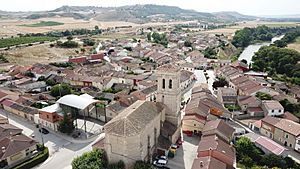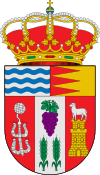Quintanilla de Arriba facts for kids
Quick facts for kids
Quintanilla de Arriba, Spain
|
|||
|---|---|---|---|
|
|||

view
|
|||
| Country | Spain | ||
| Autonomous community | Castile and León | ||
| Province | Valladolid | ||
| Municipality | Quintanilla de Arriba | ||
| Area | |||
| • Total | 28 km2 (11 sq mi) | ||
| Elevation | 740 m (2,430 ft) | ||
| Population
(2018)
|
|||
| • Total | 158 | ||
| • Density | 5.64/km2 (14.61/sq mi) | ||
| Time zone | UTC+1 (CET) | ||
| • Summer (DST) | UTC+2 (CEST) | ||
Quintanilla de Arriba is a small town, also called a municipality, located in the province of Valladolid. This province is part of the larger region of Castile and León in Spain. It's a quiet place, known for its peaceful rural setting.
Contents
About Quintanilla de Arriba
Quintanilla de Arriba is a charming municipality. It is situated in the heart of the Castile and León region. This area is famous for its history and beautiful landscapes. The town is quite small in terms of its population.
Population and Size
According to the 2017 census, Quintanilla de Arriba had about 155 people living there. By 2018, the population was recorded as 158 residents. This makes it one of the smaller municipalities in the province of Valladolid. The total area of the municipality is around 28 square kilometers.
Location and Geography
The town is located at an elevation of about 740 meters above sea level. This higher elevation can mean cooler temperatures. It also offers nice views of the surrounding countryside. The landscape around Quintanilla de Arriba is typical of the Valladolid province. It often includes fields and some natural areas.
Life in the Municipality
Life in a small municipality like Quintanilla de Arriba is often very different from big cities. People usually know each other well. There is a strong sense of community. The pace of life is generally slower and more relaxed.
Local Economy
The economy in small Spanish towns often relies on farming. Agriculture plays a big role in many rural areas. This might include growing crops or raising animals. Local businesses also support the community.
Culture and Traditions
Small towns in Spain often keep old traditions alive. They celebrate local festivals and holidays. These events are important for the community. They bring people together and share their heritage. You might find traditional food, music, and dances.
See also
 In Spanish: Quintanilla de Arriba para niños
In Spanish: Quintanilla de Arriba para niños



